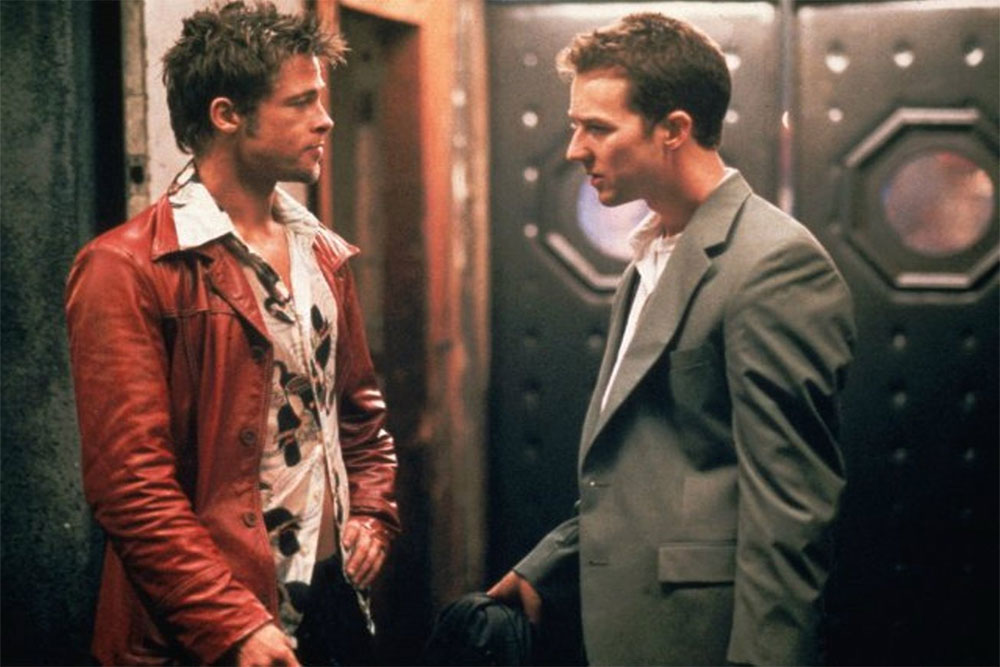Fight Club is a 1999 cult film directed by David Fincher and based on the novel of the same name by Chuck Palahniuk. The film was a landmark in late 20th century cinema, focusing on themes of consumer society, male identity and man’s internal struggle with himself. Starring Edward Norton, Brad Pitt and Helena Bonham Carter. Norton plays the unnamed narrator, suffering from insomnia and alienation, who finds solace in participating in various support groups. His life changes dramatically after meeting the charismatic Tyler Durden (Pitt), with whom he creates an underground fight club – a place where men can throw off the shackles of civilization and return to their primitive instincts. Known for its twist ending, visual storytelling style, and provocative ideas, Fight Club has made it the subject of much discussion and analysis. The film not only became a symbol of the era, but also had a significant impact on popular culture and public perception of the problem of consumerism and personal freedom.
The most famous quotes from Fight Club
Here are some famous quotes from the movie Fight Club:
Tyler Durden:
- The first rule of Fight Club is: You do not talk about Fight Club.
- The second rule of Fight Club is: You do not talk about Fight Club.
- It’s only after we’ve lost everything that we’re free to do anything.
- You are not your job. You are not how much money you have in the bank. You are not the car you drive. You are not the contents of your wallet.
- The things you own end up owning you.
Unnamed narrator (Norton):
- I am Jack’s complete lack of surprise.
- This is your life and it’s ending one minute at a time.
Tyler Durden:
- We’re the middle children of history, man. No purpose or place. We have no Great War. No Great Depression. Our Great War’s a spiritual war… our Great Depression is our lives.
These quotes reflect the main themes of the film, such as the struggle against consumer society, the search for identity and the desire for self-realization.
What is the philosophy of Fight Club?
The philosophy of Fight Club is complex and multi-layered, covering a number of themes and ideas that affect personal self-determination, the fight against consumer society and the desire for freedom. Key aspects of the film’s philosophy include:
- Criticism of consumer society
The film sharply criticizes modern consumer society, where people determine their value through material wealth and social status. Tyler Durden argues that the things we own eventually come to own us. This idea is reflected in the quote: “You are not your job. You are not how much money you have in the bank. You are not the car you drive. You are not the contents of your wallet.”
- The search for authentic male identity
Fight Club explores the crisis of male identity in a post-modern society, where traditional roles and images of men have undergone changes. Through physical combat and extreme situations, club members try to restore their primal instincts and find their true selves.
- Liberation through destruction
The film argues that only through the loss of everything can true freedom be achieved. This idea is expressed in the words of Tyler: “Only by losing everything completely can we find freedom.” The destruction of old values and systems is the path to new self-knowledge and self-realization.
- Confrontation and denunciation of the system
Tyler Durden and his ideas represent a rebellion against a system that suppresses individuality and freedom. Creating a fight club is a way to resist the established norms and rules of society.
- Existential crisis and internal conflict
The film’s narrator, suffering from insomnia and inner emptiness, personifies the existential crisis of modern man. His meeting with Tyler Durden, who turns out to be his alter ego, symbolizes the internal conflict between the desire to conform to social norms and the desire for freedom and self-destruction.
- Critique of modern work and society
The film emphasizes the idea that work and social roles rob a person of his essence and meaning in life. Tyler says: “Advertising makes us chase cars and clothes, work jobs we hate, so we can buy things we don’t need.”
The philosophy of “Fight Club” is multi-layered and open to various interpretations. Ultimately, the film encourages viewers to reflect on their lives, values, and the things that truly matter in their search for meaning and true freedom.
What does Fight Club teach us?
Fight Club teaches us many important lessons about self-discovery, criticism of consumer society, and the search for the true meaning of life. The film encourages viewers to re-evaluate their material possessions, making them think about how things and social status can take over our lives and rob us of true happiness. Tyler Durden says, “The things you own end up owning you,” reminding us that the meaning of life must be sought beyond material possessions.
One of the central lessons is that liberation and true freedom can be achieved through the destruction of old habits, values and systems. Only by losing everything completely can a person gain true freedom and understand who he really is. This process may be painful and difficult, but it is necessary for true self-knowledge and self-realization.



